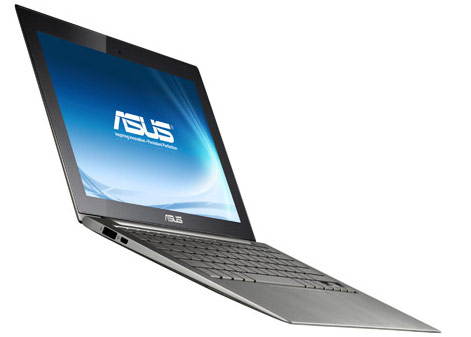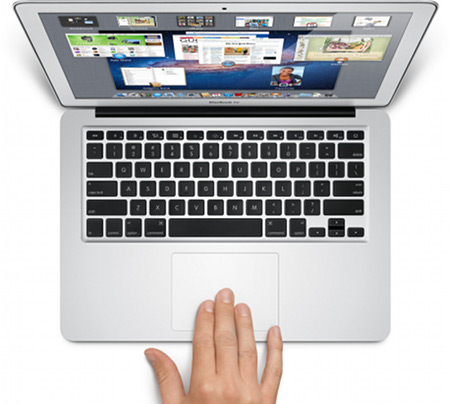Is Apple muscle squashing Intel’s Ultrabook format?
Jul 29, 2011 — by LinuxDevices Staff — from the LinuxDevices Archive — 1 viewsIntel's “Ultrabook” format for portable computers is faltering, with pioneering vendor Asus failing to meet desired price points, and others choosing to wait it out, according to Taiwanese sources. DigiTimes reports claim that selling the devices for under $1,000 will be “practically infeasible.”
Sean Maloney, Intel executive vice president and the newly appointed head of the chip makers China business, introduced the "Ultrabook" idea during his keynote speech May 31 at the Computex 2011 show in Taiwan. The chip giant has trademarked the name, which it says refers to notebooks that:
- are less than 20mm (0.8 inch) thick
- use Core processors
- start up almost instantly with the aid of SSD (solid state disk) storage
- and have "mainstream price points under US$1,000"
Meanwhile, Asus Chairman Jonney Shih joined Maloney on stage at Computex, showing off the planned UX21 Ultrabook (below). This device will be just 2/3rds of an inch thick, according to Asus, and it will reportedly use the Core i5-2557M (two cores, 1.7GHz base clock speed and 2.7GHz TurboBoost speed, 17-Watt TDP) that Intel announced at the end of June.

The Asus UX-21
At the time, we noted that Intel's 2009 CULV (Consumer Ultra Low Voltage) notebook format has disappeared without leaving many ripples, as have its "nettop," "mobile internet device," and "ultra-mobile PC" monikers. Instead of minting a new term for what most people already call "ultraportables," Intel marketers should concentrate on better naming and positioning for their overly-numerous CPU offerings, we grumbled.
Dodging our flak, Intel persevered, and is "paying handsomely to attract downstream vendors into launching Ultrabooks," according to a July 4 DigiTimes report out of Taiwan. "Vendors are still concerned whether the Ultrabook product's prices can reach as low as $1,000, as claimed by Intel," authors Monica Chen and Joseph Tsai.
Now, a followup story by Chen and Adam Hwang says "actual production costs render the hope practically infeasible. The 11.6-inch Asus UX21 and a 13.1-inch followup called the UX31 will cost between $1,000 and $1,600 because "yield rates for panels and key components are still lower than originally expected and therefore production costs are relatively high."
This July 27 DigiTimes report adds that Asus will launch its Ultrabooks only "in small volumes to test market response, and will make large-volume launches in 2012 when demand proves to emerge." If it's true, the delay will no doubt frustrate Intel's Maloney, who told his Computex audience that 40 percent of portable computers shipped by the end of 2012 will be Ultrabooks.
A promo video for the Asus UX21
(click to play)
If Apple can do it, why can't …
Unclear to us is why Ultrabooks apparently cost almost twice as much to manufacture as standard notebook computers. Certainly, SSD storage is more expensive than hard disk drives, thinner LCD panels no doubt add cost, and Intel's Core i5-2557M itself sells for $250.
However, the elephant in the room DigiTimes didn't mention is Apple. That company's revamped Macbook Air — launched July 20 — seems to exemplify an Ultrabook, right down to a "Sandy Bridge" Core processor, Intel's Thunderbolt interconnect technology, SSD storage, and a thickness of just 0.68 inches.

An UltraBook in all but name: Apple's MacBook Air
Apple's entry-level Air has a 1.6GHz Core i5 processor, an 11.6-inch display, and a 64GB SSD, while the top model has a 1.7GHz i5, a 13.3-inch display, and a 256GB SSD. Yet, these portables — which can run Linux or Windows as well as Apple's own OS X — are priced at $1,000 and $1,600, respectively.
In other words, Apple — historically castigated for high pricing — can sell de facto Ultrabooks today for the prices Asus, HP, and other competitors are only just talking about.
Why? Nobody seems to have addressed that point, but it seems likely that Apple's leverage with suppliers is bringing it lower costs than those prospective Ultrabook cloners face. That would be the same reason that most Android tablets sell for just as much as Apple's iPad 2 — despite being mere knockoffs in the eyes of consumers.
Jonathan Angel can be reached at [email protected] and followed at www.twitter.com/gadgetsense.
This article was originally published on LinuxDevices.com and has been donated to the open source community by QuinStreet Inc. Please visit LinuxToday.com for up-to-date news and articles about Linux and open source.